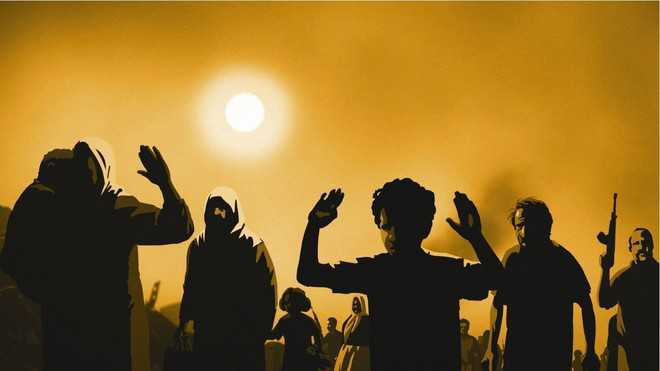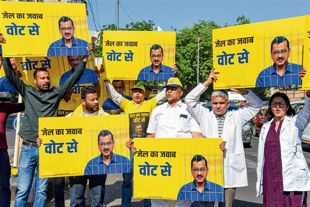
Waltz with Bashir
Nonika Singh
It is a nation of just eight million people; its language is Hebrew, which till the late 19th century was one in which people only prayed. Yet as things stand today, Israeli cinema, made mostly in Hebrew, is the darling of the film festival circuit. For the uninitiated, the ravishing Wonder Woman Gal Gadot might be the only introduction to Israeli actors. But the real aficionados are more clued in.
Israeli cinema is finding favour at many prestigious film festivals. Israeli movies were the toast and the country focus at the 49th edition of the IFFI, Goa, and the 31st Tokyo International Film Festival. In 2017, the Toronto International Film Festival showcased four Israeli movies. The 2007 Israeli film The Band’s Visit was adapted into the 2018 Tony Award Winning musical.
The conflict-ridden country is yet to win an Oscar but its films have been successfully nominated 14 times, placing it in the top 10 most nominated countries of all time, at the Academy awards. So what makes Israeli films unique and critically acclaimed? One of its most eminent film directors Dan Wolman puts it succinctly, “Its originality of ideas.”
The renewed interest in their films may or may not have something to do with its geopolitics. But politics indeed is a running thread. Till 1980s, politics was the central leitmotif. Wolman reminds us how when viewers complained of ‘too much politics,’ the shift happened. Today all kinds of subjects are being explored. In the wake of movements like #MeToo, films such as Working Woman, focusing on sexual harassment at workplace, too acquire gravitas. Genres have begun to range from comedy to horror. But Wolman says, “When there is cancer, you can’t keep talking of pink clouds.”
So it is not just he who makes it a point to make a political point or two through his films albeit indirectly. Even animation films such as Waltz with Bashir had strong political tones. Defining moments of Israeli cinema are often what the experts call the “tipping points of history such as military intervention in Lebanon.”
Then there is Foxtrot, easily the most talked about Israeli film of 2017. Since army enlistment is compulsory in Israel, many films about conflicts/wars come from filmmakers’ personal experiences, especially during the Lebanon war. For instance, Samuel Maoz’s Lebanon, winner of Golden Lion at the Venice Film Festival, came out of Maoz’s days in the army. Recently his powerful war drama, Foxtrot earned much appreciation and won the Grand Jury Prize at the Venice Film Festival.
The film was censured by the Israeli government in no uncertain terms. The film depicted the Israeli Defence Forces covering up the shooting of four Arab youths. The culture minister lambasted it for its perceived anti-Israel stance. Her strongly worded criticism, calling it a “disgrace” and a film “that can be used as a weapon of propaganda in the hands of our enemies,” did not stop the film from winning the Ophir Award for Best Film. Thus it became the Israeli entry for the Best Foreign Language Film at the 90th Academy Awards.
It certainly rattled the minister and the powers that be in Israel to bring in what is being called the ‘loyalty test.’ The government has been supporting Israeli cinema. But, in future films, which do not project the government or army in the right light, may not get government grant, the key source of funding. Producer David M Milch informs, “It is difficult to recoup your cost and there is a crowd waiting for these funds. For every 700 aspirants, only a handful of filmmakers get the money. Besides, movies are not about entertainment but food for thought. Directors like Avi Nesher (The Other Story) deal with issues at the heart of society.” As a reflection of the changing times, the LGBT community too has begun to find representation in a whole lot of films such as Bubble and The Cakemaker.
Among the vast pool of ideas, religion is yet another subject reflected on the silver screen. Redemption is about a former rockstar, who turns religious but has to go back to his band to raise money for his cancer-afflicted daughter. Writer-director Tsivia Barkai Yacov’s debut feature film Red Cow, set in an Israeli settlement in East Jerusalem which premiered in Berlin’s Generation section, sets off a young daughter’s discovery of her sexuality and her father’s sectarian choices.
The Other Story brings out an interesting trend about how the youth is becoming more orthodox and drifting away from the parents. The film that deals with a young girl’s struggle between her boyfriend’s religious beliefs and her family’s progressive thought is ultimately about the need to understand others’ perspective. But not all films are so democratic or espouse values of tolerance and harmony. As Wolman says, “People are people all around the world. We have a Left thought, and then we have filmmakers who are vocal about terrorism.”
Family values, however, bind several films, though not in a formulaic or overtly sentimental fashion. There is no formula equivalent of Bollywood/ Hollywood in Israeli films.
Baring the tormented soul of the country perpetually at war, it is as much a searing document of its conflicts as an attempt at resolution of the conflict. In short, a whole lot of films are a critique of its evolving society and worth critiquing too.



























